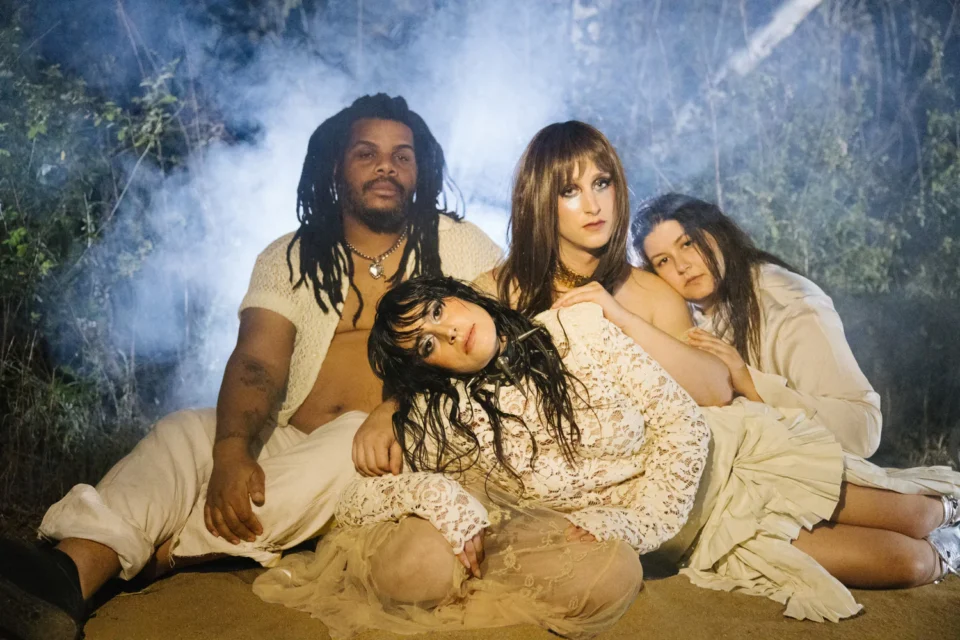
Philly band Mannequin Pussy tapped into a cathartic rage mixed with desire with their first three albums, which have vaulted them to favorites on the edge of the hardcore scene and punk scenes. One might say that they have softened their hardcore edges or reached a new stage of maturity on their fourth and excellent album, I Got Heaven, because Mannequin Pussy’s sound has achieved a dynamic range that goes from scream to a mellowed-out brushed drum and a gentle whispered delivery from lead singer Marisa Dabice. But then you have to take into context that the album cover is a reference to an inside joke about cranking one’s hog made by “devious, perverse gremlin” of a producer John Congleton.
“We take the craft very seriously, but we don’t really take ourselves very seriously,” Dabice tells me on the afternoon that Pitchfork named I Got Heaven “Best New Music.” She was visiting the Fucking Awesome warehouse in L.A. and riding the high of praise for her incredible effort. In our interview we get into what it means to change and grow as a band, how John Congleton mixed right in with the band’s perverse sense of humor and if we can even legally say their band’s full name on the radio. Listen to the full interview and all interviews on our WNXP podcast channel.
On producer John Congleton
“His vibe, and I mean this in the most complimentary way, is that he is just a devious, perverse little gremlin,” said Dabice.
“He’s just out there just like kind of messing with people. I think he enjoys getting a rise out of people by saying something a little shocking or perverted. And it’s very, very similar to the way that we are as people in Mannequin Pussy. We all we have this perverted sense of humor. At the same time, for all that deviousness and that play, he has such a calm and a wisdom to him. I definitely had a day where I cried to him or I was just like, ‘I don’t know where I am anymore’ and I couldn’t see where we were at the moment. We were so in the middle of it. And he just let me cry and was just very supportive and really listened and just kind of reminded me that there’s always going to be tears. Whether it’s the the tears of frustration or the tears of joy or the tears of sadness, tears are also this natural aspect of life sometimes for when you allow yourself to get overwhelmed by your own emotions.”
Dabice continued about producer John Congleton: “He really meshed with us so well. He really has an ability to insert and assert himself within the context of a group. His presence is both strange and familiar all at the same time and there’s just like an immediate comfort in the work. His approach to music was the same as ours which is that you’re playing music. You are experimenting with things. It is not that serious, but it is also everything. But it is also nothing. And so it’s these contradictions that are all kind of floating around each other at the same time. He also he has such a relaxed approach where very often [he’d] not let us do more than three or four takes of something.”
I asked the singer if she could cite an example of Congelton asserting himself in such a way in the making of I Got Heaven.
“There was one thing,” she said. “It was a song that I ultimately decided to cut, but it was an acoustic ballad that I had made where I put Auto-Tune on my voice, kind of like more in the Frank Ocean [or] Alex G kind of way. We’re using it as an aesthetic tool and John hated it. He was just so adamant about Auto-Tune being the worst. He was like, ‘It is not an aesthetic choice. It’s just bullshit. It is hiding.’ And you know, I enjoyed how passionately he hated it.”
On feeling the rage
“I think that there has always been this energy inside of me. I’ve kind of struggled for a long time in my life with my rage,” said Dabice. “I don’t have an anger problem. I certainly have an attitude problem, but not an anger problem. But I just feel this, like, simmering rage inside of me all the time. That’s just been around since I was a child. I was just confused by other people’s cruelty and confused by other people’s tenacity for violence. I’ve never understood that relationship between human beings as this intensely violent one. And it’s just always disappointed and angered me. If you walk around with those feelings inside of you too much without finding a way to transfer that energy into something, it kind of just eats at you like a poison.”
Music is how Dabice channels or transfers that energy. “There’s something about that kind of intentional chaos and the catharsis that it can reward. Everything I love about making music is that you’re able to make something that is cathartic and rewarding, while at the same time acting as a conduit of creativity and chaos.”
On changing sound as a band over time
About this new record, Dabice considered, “I think it’s just such a reflection of who we are. You never know how an idea is really going to form. You never really know what it’s going to inspire in you. So, it would be a shame to feel closed off to something that maybe felt different than the last thing that you wrote or was different than historically what you’ve done, because there’s an expectation of you as a rock band or a punk band to sound one particular way. To me, that’s monotonous. I think something about artists is that we kind of shun a bit of the monotony of life because we’re trying to be creators a bit more than we are consumers, when that’s a possibility. So I feel like music that is appropriately honest and vulnerable has to reflect the very nature of human emotions, which is that the same situation one day maybe made you feel absolutely enraged, and with time you feel peace with it.”
On the difficulty of relationships
“We’re so trained to constantly be in the pursuit of partnership. I think very often we’re not fully comfortable with who we are when we’re kind of pushed out of the nest,” said Dabice. “We are told the the most important thing in your life is to find someone who loves you and who you love, instead of being told that the most important thing in your life is determining who you are with the confidence and the care and the work that goes into that so that you can be ready for someone else. Rather than two people who have no idea what their identities really are, just kind of like fumbling all over each other.”
On if we can legally say their band name on the radio
Mannequin Pussy is a band name we at WNXP have cautiously shorted to Mannequin P when announcing their songs or tour news, just to be safe. But Marisa Dabice shed some light on the gray area: “There’s actually a Supreme Court case that is in our favor with this. The Supreme Court actually determined the legal definition of obscenity back in the ’70s. The case is Miller v. California and the Supreme Court determined that something is only considered obscene if it lacks inherent artistic, intellectual, creative, or cultural value. I would argue that by virtue of being a band, we are inherently all of those things that negate the obscenity from it.”
On what they have been listening to recently
“I’ve been revisiting Granddaddy so hard lately,” said Dabice. “I listened to the new album [2024 release Blu Wav] and I loved it. But…the old stuff had a bit more of a different type of energy. There’s like a little bit more peaks in it that kind of hype me up. And so I’ve been listening to ‘A.M. 180.’ It’s just such an incredible song…I think the first time anyone hears that song, they’re just immediately drawn into it.”

